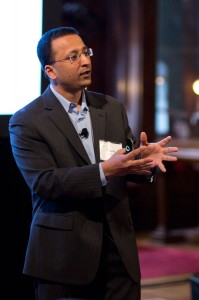 Piyush Gupta
Piyush GuptaPiyush Gupta received his Bachelor of Science degree in mathematics from the University of Chicago. He received his PhD in Biology at MIT, studying various aspects of cancer progression with Robert Weinberg. In post-doctoral research with Eric Lander at the Broad Institute, he applied the tools of genomics to cancer biology. He is currently a member of the Whitehead Institute and is an as Assistant Professor in the Department of Biology at MIT. His laboratory studies the signaling pathways that control stem-differentiation decisions in adult tissues and the role that cell-state perturbations play in cancer progression and therapy response.
His first lecture presented on Monday May 11th 2011 was titled:
“The Translation of Basic Cancer Research From Laboratory to Clinic”
The objective of basic cancer research is to understand the molecular and biological processes that underlie the formation and progression of cancer. While the development of novel treatments is not its immediate goal, basic research has had remarkable success in enabling some of the most effective and promising anti-cancer therapies. Taking two fundamental questions about cancer biology as a starting point, this presentation will trace the path of curiosity-driven research and its culmination in the translation of research discoveries into novel classes of anti-cancer therapies.
His second lecture presented on Monday May 12th 2011 was titled:
“Identification of Selective Chemical Inhibitors of Cancer Stem Cells”
Subpopulations of cells in tumors, termed cancer stem cells (CSCs), exhibit numerous malignant traits including increased invasive and metastatic ability, as well as an increased resistance to cell death. CSCs are also resistant to radiation and many forms of chemotherapy. Although there is a clear need to identify agents that can target CSCs, the transience of CSC subpopulations in culture has made it difficult to identify such agents via classical screening strategies. We have developed a novel high-throughput screening strategy to identify chemical compounds that are selectively toxic towards CSCs. This strategy utilizes sibling paired populations of cells that have or have not been stably trapped in a CSC-like state through induction of an epithelial-to-mesenchymal transition (EMT), a transdifferentiation program closely linked to the CSC state. Implementation of this approach in a screen of over 310,000 compounds has resulted in the discovery of compounds that exhibit high selective toxicity towards CSCs and cancer cells having undergone an EMT. This presentation will describe the screening approach and results, and will also discuss how the identified selective compounds are being used as probes of CSC biology.